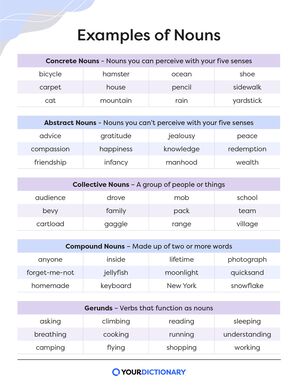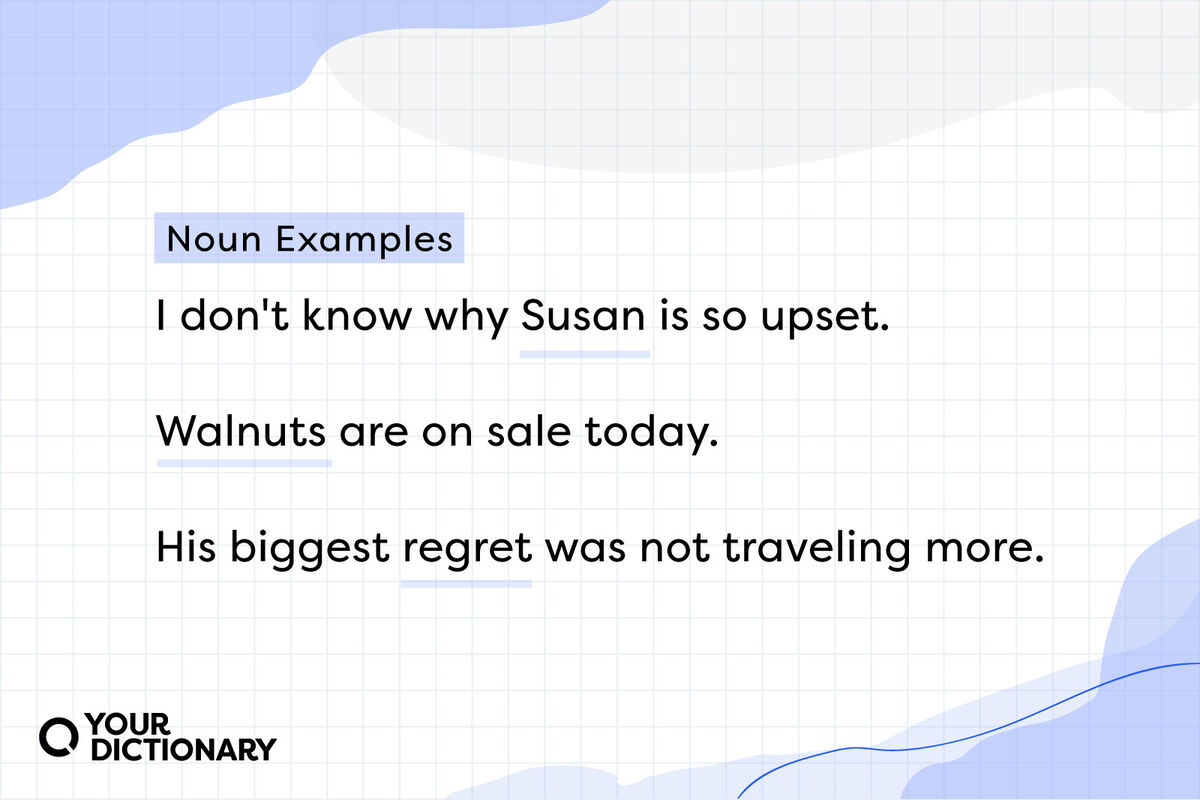

A noun is a part of speech that names a person, place, thing, idea, action, or quality. But choosing the correct noun can sometimes be trickier than it seems. Take a look at several noun examples to learn more about writing and communicating clearly.
Nouns Used in a Sentence
The main types of nouns are proper nouns and common nouns. Proper nouns are always capitalized and refer to the individual name of a person, place or thing. Common nouns don’t usually refer to a specific person, and are only capitalized when they appear at the beginning of a sentence. You’ll use both types of nouns to refer to various people, places, things, and ideas.
Noun Examples: People
When you’re referring to a person’s name, you use a proper noun, such as Katie, Mrs. Miller or Dr. Edwards. However, general words for people, such as child, father or mechanic, are common nouns.
Examples of nouns that refer to people include:
- Joey caught a grasshopper with his bare hands.
- Roger drives a blue truck.
- Has your cousin donated blood lately?
- I don't know why Susan is so upset.
- The teacher writes notes on the blackboard.
- This customer needs to replace her keyboard.
- How many students attend Stanford University?
- Lorraine prefers juice over water.
Noun Examples: Places
Nouns can also refer to places, whether they are specific places (proper nouns such as Portland or Lowell’s Repair Shop) or general locations (common nouns such as the airport or the school). For example:
- Did you know that Africa is much larger than Greenland?
- Let’s stop by the store on the way home.
- Visiting Big Ben was a highlight of the trip to London.
- There’s a new penguin exhibit at the zoo.
- Minnesota borders directly with Lake Superior.
- What college did you attend?
- I love walking downtown during the holidays.
- If I had known about it, I would have signed up for the loyalty program at Starbucks.
Noun Examples: Things
If it’s not a person or a place, it’s probably a thing. Specific nouns that are considered things can be proper (such as the Dead Sea Scrolls or the United Nations), while nonspecific things are generally common (a stapler or a puppy). For example:
- Can you add a banana to my smoothie?
- That's his favorite book.
- Her blue eyes instantly captured his attention.
- Hidden from view, the Amur leopard stalks its prey.
- Can I get the pork cutlet with rice?
- Eugene stores the wood in the garage.
- Learning to play ukelele has been very challenging.
Noun Examples: Ideas
What do you call a noun that you can’t see or touch? It’s an idea, such as nouns like happiness, poverty, education, and gratitude, and is almost always a common noun. For example:
- Let me give you some advice.
- Life finds a way.
- With great power comes great responsibility.
- His biggest regret was not traveling more.
- The country fought for independence from its oppressors.
- Our classroom filled with laughter at the teacher’s hilarious joke.
- The economics of the matter are quite complex.
- It’s a joy to work with such a supportive team.
Other Types of Nouns
Beyond people, places, things and ideas, you can categorize nouns grammatically. These types of nouns include:
- concrete nouns - nouns that physically exist, and you can access with the five senses (rain, carpet, homework)
- abstract nouns - idea nouns that you can’t access with the five senses (love, anger, patience)
- collective nouns - singular nouns that refer to multiple nouns (army, team, family)
- compound nouns - two nouns put together to create a new noun (sunlight, rattlesnake, wheelchair)
- gerunds - verbs that end in -ing and function as nouns (camping, flying, breathing)
Printable Noun Examples Chart
The chart below includes the various types of proper and common nouns, as well as definitions and examples of each type of noun:

Learn More About Nouns
If you are looking for more information on different parts of speech, check out: